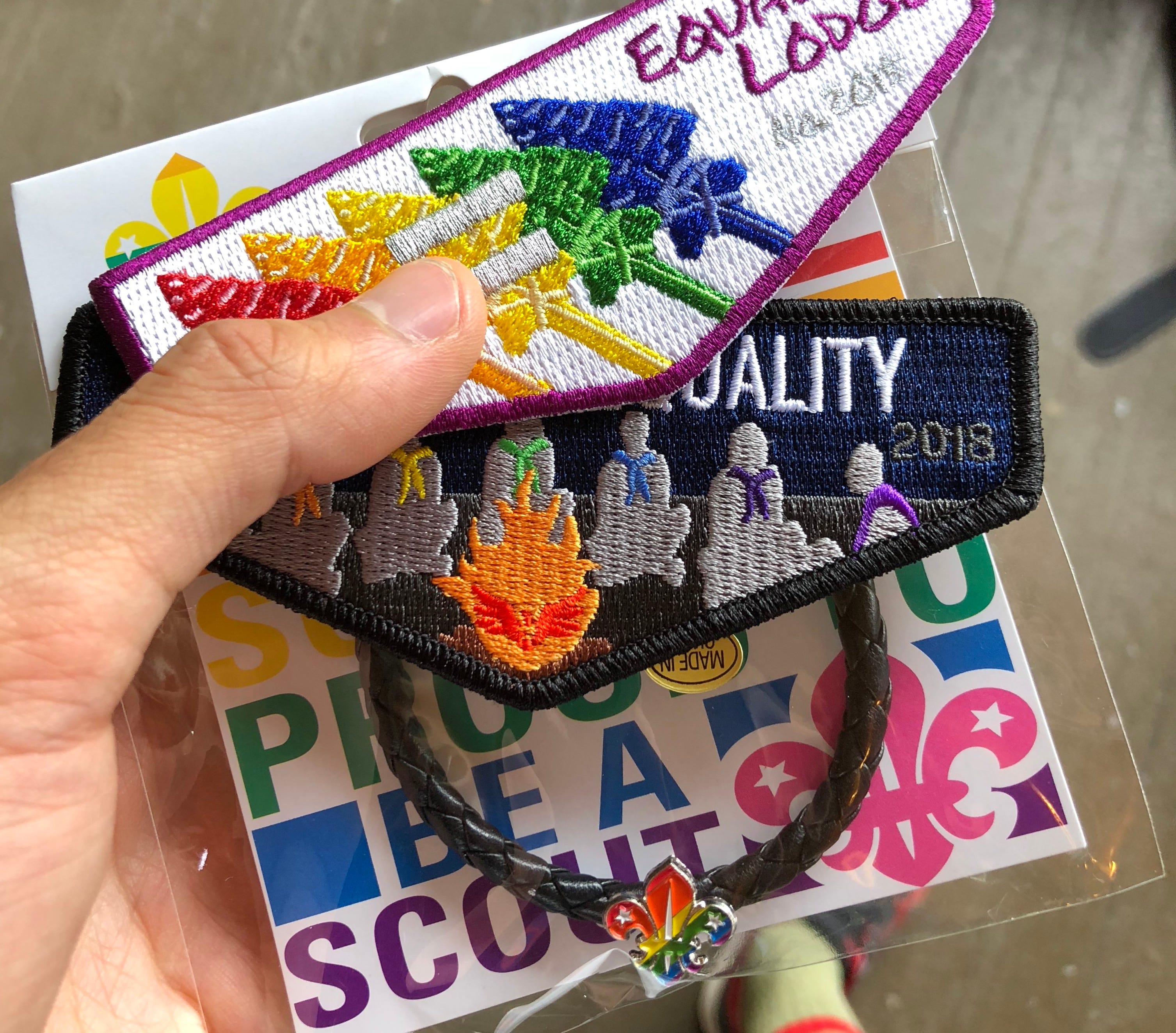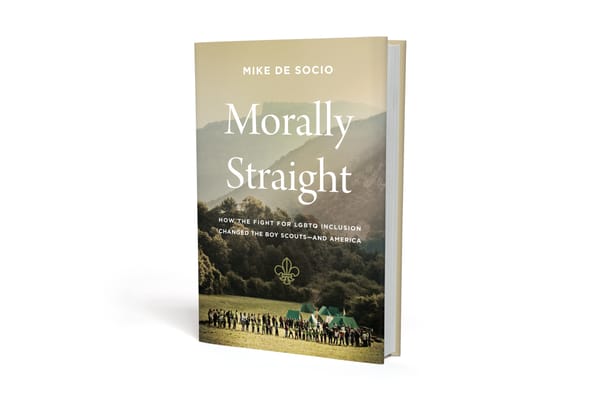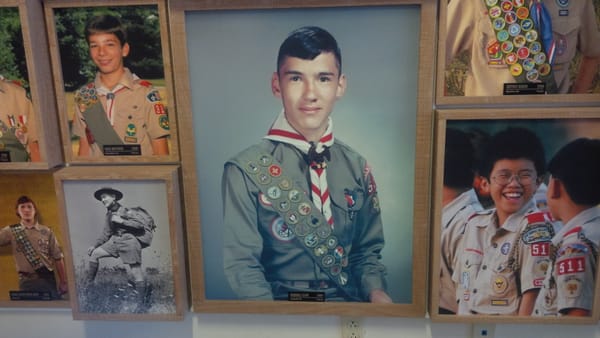Scouts for Equality shuts down: Looking back on eight years of activism, with Justin Wilson
Justin Wilson served as Scouts for Equality's executive director from 2015 until 2020. He reflects on what the group was able to accomplish, and the work that remains.

Justin Wilson was riding the bus into work one morning when a Facebook post caught his eye: Jennifer Tyrrell, a Cub Scout leader in Ohio, had been dismissed from her pack for being gay. Wilson clicked through to the Change.org petition, signed his name, and offered to help in any way he could.
Wilson was an Eagle Scout and even worked for his council as a district executive after college, but although he knew the anti-gay policy existed, he had never seen the harm it could cause firsthand.
“In the back of my mind I had always thought that if it ever came down to it, where we had a situation where someone was going to be removed from the Scouting program, I had my resignation letter ready, because I wasn't going to stand for that,” Wilson said.
He never had to use the letter. By the time he came across the Facebook post about Tyrrell in 2012, he had moved on to a career in IT, and he certainly didn’t see himself as an activist.
But he wanted to support the cause, so he started a local petition of his own, advocating for the Scouts to drop their anti-gay membership stance.
“My thought was, I was a district executive in this very close-knit Scouting community, in this small Iowa town, and naively I thought because I was very well-liked as a district executive, that surely everyone would just jump on board with this and it would be the easiest thing to get support for this. And as you can probably imagine, it was quite the opposite,” Wilson said.
He lost friends over it. But seeing the pushback made him dig his heels in even more.
“It was one of the few things in my life at that point where I was just absolutely certain that I was on the right side of this,” Wilson said.
Over the next few years, Wilson would rise to the national level of Scouts for Equality, the organization that led the push for gay inclusion, as a community organizer. After the policy finally did change in 2015, SFE’s founding director Zach Wahls stepped down and handed leadership of the organization to Wilson.
It was a natural evolution: Wahls had used his strengths in the policy arena to achieve a major goal, and Wilson could take his passion for community building to the next challenge: local engagement and cultural change.
“Ultimately over the course of time what we found worked best was in-person, Rainbow Cafe-type activities at national and regional and local events,” Wilson said.

The idea behind a Rainbow Cafe was simple: Establish a space where people could gather, meet fellow LGBTQ Scouts and allies, and find resources to bring back to their local troop. The execution, however, was much more fraught.
At the National Jamboree in 2017 — Scouting's premiere national event that attracts upwards of 40,000 guests — Wilson partnered with the United Church of Christ and Unitarian Universalist Association to run a booth in the faith tent. The rules severely limited what the Rainbow Cafe could look like: For one, it couldn’t bear that name or display any rainbow imagery. So Wilson kept the space fairly generic, but offered some Scouts for Equality materials and a small piece of swag: a rainbow square knot patch that scouts could stick on their uniforms.
Soon, scouts all over the Jamboree were running around with rainbow patches, and Boy Scouts leadership wanted an explanation. When Wilson and his volunteers refused to change course, the BSA threatened to shut down the booth and escort them off the property.
"In a rather ironic twist of fate, it was that evening that President Trump came and spoke to the National Jamboree. And suddenly, the general counsel's office decided they had bigger priorities in terms of public relations,” Wilson said.
The following year, Wilson tried once again to establish a presence at a national Scouting event, this time at Indiana University for the Order of the Arrow conference. Scouting leadership ignored his requests for involvement, so he set up a Rainbow Cafe on the porch of the university’s LGBTQ+ Culture Center, which was right alongside the conference program areas.
The cafe was hard to miss, with rainbow streamers and large banners, so even though signs for the cafe were torn off message boards around campus on a daily basis, Scouts gravitated there anyway. And it being public property, Wilson and his team had every right to be there.
"People saw the cafe and were really drawn to it, and we had a really fantastic Rainbow Cafe, I would consider that the most successful one that we've had,” Wilson said.

But while he managed, against the odds, to organize and build community at national events, Scouts for Equality was never able to create a cooperative relationship with the Boy Scouts of America.
"The BSA essentially, from our perspective, treated us as if we didn't exist. ... If they were to recognize us, that would almost empower us in some ways,” Wilson said.
It was in that environment that Scouts for Equality, about a year ago, decided to shut down operations. Its last remaining goal was to change the BSA’s requirement that Scouts “affirm a belief in God.” (It doesn’t tell Scouts which religion to practice, but it technically prohibits atheists). Wilson didn’t see a feasible path to changing that policy, and didn’t want SFE to simply fade out.
Plus, in 2020 the BSA had finally started to embrace LGBTQ programming internally: A group of scout volunteers were planning a sanctioned LGBTQ space that would have been held at a national conference this past summer, only to be cancelled due to the pandemic.
“We started from the outside because we had to. And then once we stepped away, we were really hoping that someone on the inside would be picking up this work, and much to our delight, we saw that that was in fact happening,” Wilson said.
Looking back on the five years he spent coordinating volunteers across the country, Wilson is happy to see many people carrying on the same tactics today to create cultural change. And he has been “really shocked” to see how the new Diversity, Equity and Inclusion Merit badge is taking shape.
"I was really surprised that the BSA went that far with it,” Wilson said, noting the badge’s requirements that troops think about how they can be more welcoming of all scouts, regardless of their identities. Inclusion is no longer a niche topic, but baked directly into the program itself, Wilson said.
"With the policy change, it's a binary, it's on or off, right? With the culture change it's always kind of a percentage, it's a continuum. And with every bit of institutional adoption that we get within BSA, it moves it a few percentage points forward to cultural adoption,” he said. (The BSA has since delayed the rollout of the badge to allow “for the careful consideration and evaluation of feedback," likely from more conservative members.)
Wilson sees the BSA’s current atmosphere — cratering membership amid a pandemic and sexual abuse scandal — as its greatest existential threat so far. But if it can survive, it will be left with the difficult task of evolving the culture fast enough to attract new members, without moving too fast and losing current members.
"It’s an incredibly difficult tightrope for them to walk, and I empathize with that. But the reality is, they’ve made the tough decision to change the policies, and the organization culturally should reflect policies that now exist,” Wilson said.
Have a friend who might like this newsletter? You can share it with them, and I've already written the email for you — all you have to do is click here, and add your friend's email address. Thanks for sharing!


